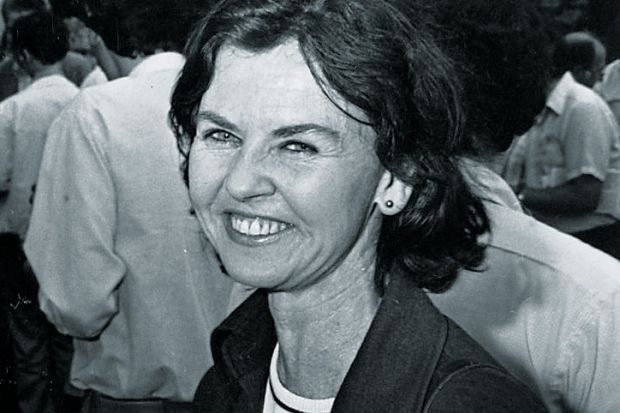Beverly Griffin was born in Delhi, Louisiana on 23 January 1930 and received her BSc at Baylor University in Texas (1951) before going on to doctorates at the University of Virginia (1955) and the University of Cambridge (1958).
She began her career as a lecturer at Mount Holyoke College in Massachusetts (1958-61) before returning to Cambridge as a senior research associate in the department of chemistry (1961-68) and then a staff scientist at the Laboratory of Molecular Biology under the Nobel prizewinning biochemist Fred Sanger (1968-72).
In 1972, Professor Griffin joined the Imperial Cancer Research Fund laboratories at Lincoln’s Inn Fields in London as head of nucleic acids research. It was here that she completed the genetic sequencing of the mouse polyoma virus, whose 5,293 base pairs made it in 1980 one of the longest pieces of DNA ever sequenced.
In 1984, Professor Griffin moved to the Royal Postgraduate Medical School at Hammersmith Hospital (which became part of the Imperial College School of Medicine in 1997) to become professor of virology.
From 1995, she also served as honorary professor and consultant in the department of genetics and microbiology at Charles University in Prague. She continued her work on the Epstein-Barr virus (EBV), responsible for a range of cancers, and cloned a number of genome fragments that were later used to determine the sequence.
“Beverly made very important contributions to the field of Epstein-Barr virus research,” explained Paul Farrell, head of Imperial’s section of virology, through “identif[ying] regions of the EBV genome that are expressed in cases of nasopharyngeal cancer” and “report[ing] their ability to cause cancer-like growth properties in human cells”.
Although she was “on to something important”, she was also “ahead of her time” because “there did not seem to be viral genes that could account for her results. Now we know that EBV makes a large number of micro RNAs from this part of the viral genome, and these are thought to play an important role in some EBV-associated cancers.”
Along with her more theoretical work, Professor Griffin was a keen supporter of Elizabeth Molyneux’s campaign to combat Burkitt’s lymphoma and childhood cancers in sub-Saharan Africa.
She herself made a number of trips to Malawi and was largely responsible for a poignant documentary, Surviving Burkitts, which traced a mother’s journey there to discover more about the cancer that had taken her son’s life.
Professor Griffin died on 13 June and is survived by her husband, Tomas Lindahl, a fellow cancer researcher who shared the 2015 Nobel Prize in Chemistry, and two stepchildren.
Register to continue
Why register?
- Registration is free and only takes a moment
- Once registered, you can read 3 articles a month
- Sign up for our newsletter
Subscribe
Or subscribe for unlimited access to:
- Unlimited access to news, views, insights & reviews
- Digital editions
- Digital access to THE’s university and college rankings analysis
Already registered or a current subscriber?




